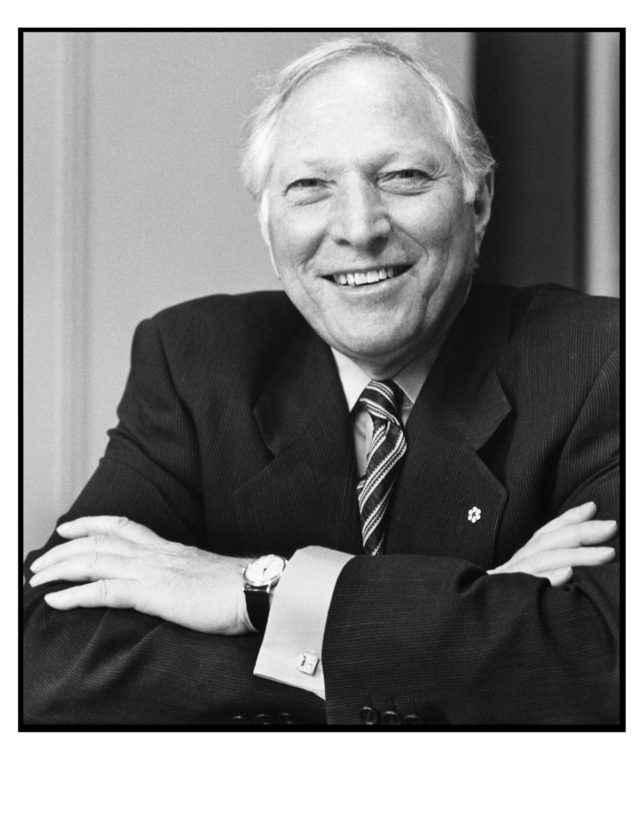Joseph Rotman, A Great Canadian
Mr. Joseph Rotman passed away on January 27, 2015, a short period after his 80th birthday. Amongst his many current activities, he was founding Chair of the Ontario Brain Institute (OBI).
Ever since then, I have been receiving e-mails from those associated with OBI which described him in phrases like:
- A great ambassador for, and champion of, the Ontario Brain Institute
- A very dear friend
- A great leader
- A force of nature
- One-of-kind person, generous, persistent, visionary and above all – inspiring
- He had untold impact on research and various public institutions. He truly bent his energy resources, connections and knowledge to public service
- His legacy will be enormous
- A great man, a pillar of our civil society
The e-mails invariably end with some way of stating: He will be sorely missed.
And this is just the Ontario Brain Institute. This story, these phrases, are being repeated in the many circles in which he recently played, or had previously played, an important role.
- Chair of the Canada Council of the Arts.
- Past President of the Art Gallery of Ontario.
- Past President of the AGO’s board of trustees, as well as head of other board positions.
- Co-founder of Toronto’s Medical and Related Sciences (MaRS) Discovery District in 2005.
- Founded the UofT Rotman School of Management.
- Founded Baycrest’s Rotman Research Institute.
- Founded Western Rotman Institute of Philosophy.
And this does not include the positive influence he had in the business community, and with governments at both the provincial and federal levels.
His achievements have been listed in many obituaries. I would like to write from a more personal viewpoint. Everyone who knew Joe can speak to his incredible persuasiveness. And to my knowledge, I am one of the few people that said “no” to Joe … three times! Well, I too can speak to Joe’s persuasive powers and admit that, on the fourth effort, I said “yes”. This led to my transition from being a clinician/researcher in Ottawa to becoming in 1989 the founding Director of the Rotman Research Institute at Baycrest.
It is the “why” of his persuasiveness that is most important. Why would I change my mind? First, he painted a vision of achieving outcomes that would be unprecedented, and amongst the best in the world. Second, once Joe saw something in you that was important for the vision he wished to achieve, he wanted to make sure you knew what you were giving up. Third, he committed himself to the achievement, to being a partner. And that commitment was to the vision – but even more importantly, it was to the individual personally. If he was asking you to shake up your life, you became family – and family was more important than even the vision. (Of course, that did not mean diminishing the standards of accomplishment he expected). This was the beginning of a close to 30-year relationship with Joe – the source of much joy and accomplishment for me.
That was his secret of success. Joe was personally invested in the success of every one of his undertakings and the greatest asset he provided to each organization was himself. He generously invested his time in people and relationships by mentoring leaders and sharing his wisdom with those with whom he worked. In OBI, he did this with all the staff. We held quarterly “Chair updates” where all staff members, in particular the more junior staff, presented to the Board Chair. Joe loved these updates, mentoring each individual, and seeing how much better they were at the next update. This was his real philanthropy – he considered his time and experience more valuable than any money he could give.
Among his many achievements Joe to the end of the first decade of 2000 helped establish the Ontario Brain Institute, pulling me out of retirement to become the President and Scientific Director. His reasoning – we were partners, and we had not finished our job in relation to brain health. He was central to rallying the resources and support required to launch the Institute, and as the Founding Chairman of the OBI Board Joe saw scientific excellence, commercialization, and translation to health impact of equal importance. As a trained economist, he thought in terms of systems. Through OBI he envisioned an ecosystem of openness and collaboration that would transform Ontario’s research excellence into both health and economic impact. He saw the existing strength of Ontario but recognized its greater potential and challenged us to work towards this vision. As the OBI developed its plans for “doing science differently” Joe was a guiding force, ensuring that all aspects leveraged existing resources and investments, harnessed Ontario’s strengths, forged ensuring and fruitful partnerships, and address key gaps toward building a strong system of innovation.
It is with great sadness that we say farewell to our intrepid leader and this great Canadian. But Joe’s legacy will live on through OBI and the many other organizations that he developed, nurtured, and led over his 80 years.
He will be remembered by all these individuals as an unmatched leader, a great Canadian, a visionary, a mentor, a pillar of society, and importantly- a friend.

